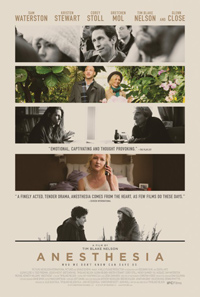Causality and Kindness: Nelson’s Latest Look at All the Lonely People
 The multifaceted Tim Blake Nelson unveils his latest directorial effort in nearly seven years with Anesthesia, a New York set drama focused on a series of interconnected characters leading up to a brutal crime of the narrative’s central figure. It’s sometimes easy to forget Nelson, perhaps best known as a character actor in an incalculable amount of arresting performances across a variety of films, is also an accomplished writer and director, premiering his own eclectic five features since his first (and best) 1997 debut Eye of God. Since then, he made a contemporized version of Shakespeare’s Othello in 2001 with O, an English language drama centered on a rebellious group of Sonderkomandos attempting to overthrow their Nazi captors in the grueling The Grey Zone (also 2001) and a comedy crime drama Leaves of Grass (2009) with Edward Norton pulling double duty as twins. His latest effort requires a bit too much suspension of disbelief in its hyper literate approach to a smattering of (mostly middle to upper class) interconnected Manhattanites grappling with their own considerable personal demons, and its approach will most likely earn unfavorable comparisons to items such as Paul Haggis’ 2005 drama Crash. And yet, Nelson manages an undeniable sincerity, enhanced considerably by several surprising performances from his large ensemble of notable actors.
The multifaceted Tim Blake Nelson unveils his latest directorial effort in nearly seven years with Anesthesia, a New York set drama focused on a series of interconnected characters leading up to a brutal crime of the narrative’s central figure. It’s sometimes easy to forget Nelson, perhaps best known as a character actor in an incalculable amount of arresting performances across a variety of films, is also an accomplished writer and director, premiering his own eclectic five features since his first (and best) 1997 debut Eye of God. Since then, he made a contemporized version of Shakespeare’s Othello in 2001 with O, an English language drama centered on a rebellious group of Sonderkomandos attempting to overthrow their Nazi captors in the grueling The Grey Zone (also 2001) and a comedy crime drama Leaves of Grass (2009) with Edward Norton pulling double duty as twins. His latest effort requires a bit too much suspension of disbelief in its hyper literate approach to a smattering of (mostly middle to upper class) interconnected Manhattanites grappling with their own considerable personal demons, and its approach will most likely earn unfavorable comparisons to items such as Paul Haggis’ 2005 drama Crash. And yet, Nelson manages an undeniable sincerity, enhanced considerably by several surprising performances from his large ensemble of notable actors.
We observe Walter (Sam Waterston), a Columbia University professor, as he buys flowers for his wife, a verbal interaction transpiring out of earshot. Moments later, he’s violently stabbed in the street by an unseen assailant, falling into the doorway of a building and randomly buzzing apartment numbers for help. A couple (Corey Stoll, Mickey Sumner) is awakened by his cry for help as an ambulance arrives. The narrative then backtracks to a week earlier as Walter meets with his son (Tim Blake Nelson), troubled by his wife’s (Jessica Hecht) possible cancer diagnosis and his children’s (Ben Konigsberg, Hannah Marks) own conventional preoccupations. Walter also is assisting an emotionally troubled student, Sophie (Kristen Stewart), and has recently informed his wife (Glenn Close) he’s decided to retire. Other tangential characters will eventually find themselves peripherally related to Walter, such as the unhappily married Sarah (Gretchen Mol) and a distracted lawyer (Michael K. Williams) who shows up to shove childhood bestie Joe (K. Todd Freeman) into rehab before jetting off to work on a case.
There are a few too many moments where Anesthesia veers into overbearing pontification, such as Waterston’s frequent musings to his student body distractingly played over visual montage. The usually warm Sam Waterston is agreeably cast as the well-meaning Columbia professor, though all these odds and ends distract from the portrayal of his marriage (an underutilized Glenn Close). Less well developed characters and their equally underwhelming scenarios seem false, often highlighting moments of hollow dialogue. These include Hannah Marks and Jessica Hecht as the daughter and wife of Nelson’s character, grappling with familial issues surrounding the mother’s cancer diagnosis (wherein Richard Thomas pops up as a school counselor), and a banal suburban portrait of infidelity between Gretchen Moll and Corey Stoll, while Gloria Reuben, Mickey Sumner, and Natasha Gregson Wagner appear briefly as friend, lover, and enemy, respectively. And other tangents feel imbalanced by the sheer intensity of a stand-out performer, particularly a galvanizing K. Todd Freeman as a struggling drug addict wanly assisted by a friend (Michael K. Williams as the underwritten end of the scenario).
Likewise, Kristen Stewart impresses in a handful of floating sequences as a troubled student, and beautifully navigates what could have been merely a preachy monologue on contemporary disconnectedness. Despite the contrivances (including a random undermining sequence featuring her character self-abusing, as if we have to witness it first hand for good measure), Stewart manages to be one the most emotionally compelling characters.
Despite its dramatic integrity, Anesthesia is too heavy-handed by default, too cluttered with disconsolate characters for all of them to matter. Ironically, this essay on loneliness and the necessary virtues of being able to know not just love but also pain (one wonders if Nelson structured these ideas around the compelling last line of dialogue) confirms too much concentrated ‘interaction’ results in the same sense of disconnect.
★★½/☆☆☆☆☆


